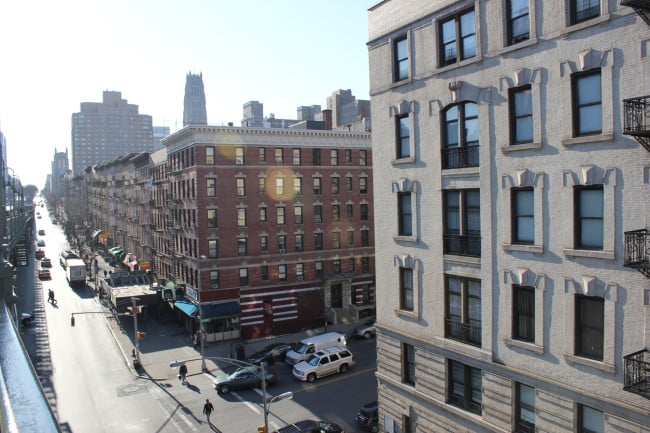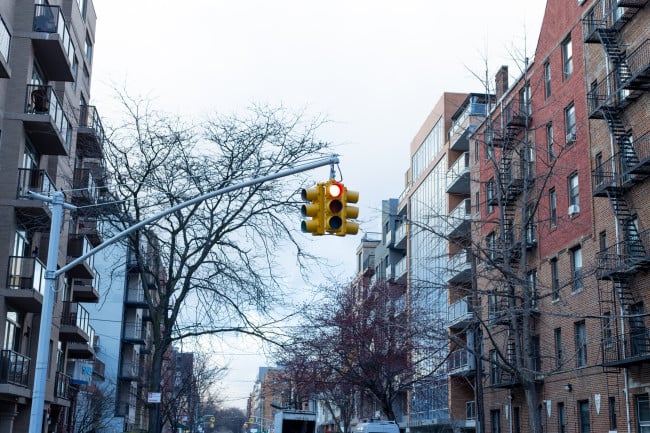How much does it cost to move to NYC?
- Broker fees are 12 to 15 percent of the annual rent, but you may find a no-fee apartment
- Most owners charge the first month's rent plus a security deposit equal to one month's rent
- You may need to pay for a third-party guarantor to meet a landlord's income requirements

Moving to NYC can be expensive, but there are ways to save money if you plan ahead.
iStock
If you're thinking of moving to New York City, you're not alone. After a brief pandemic exodus, people are returning here in droves for work, school, and all the things that make the city special—namely a happening restaurant, concert, theater, and cultural scene.
As such, the real estate market is as competitive as ever. Housing hasn’t gotten any cheaper, proof positive of the city’s continued appeal to recent grads (or grad students), young professionals, remote workers, creatives, growing families, and empty nesters alike. High rents and sales prices are also indicative of the ongoing housing shortage. Prepare for bidding wars, even in rentals.
Want to stress less about your NYC living situation? Staying in a Blueground apartment means no worrying about buying appliances, furniture, or linens — but that’s just the beginning. We carefully curate each of our move-in-ready homes to make sure that our guests have everything they need to feel at home and free to roam. Even better, all of our apartments are located in sought-after, central neighborhoods where you can stay for 30 days, a year, or longer. Click here to check out our available apartments in Manhattan, Brooklyn, and Long Island City.
Other not-so-good news is that there are a lot of other costs you need to budget for when you move here.
Now for some good news: New developments sometimes offer baked-in perks like fitness centers, swimming pools, playrooms, screening rooms, and shared workspaces, so you don't have to shell out additional money for those kinds of activities (but others may charge an amenity fee). And landlords are increasingly open to guarantors—including third-party guarantors—if you fail to meet the notoriously stringent 40-times-the-income threshold for renting, though for a fee.
You can also lean into Brick Underground's crash-course guide to apartment hunting, tips on beating out the competition, and our best advice for landing a rent-stabilized apartment through NYC's housing lottery.
[Editor's note: An earlier version of this article ran in September 2020. It has been updated with new information for October 2023.]
Read on to find out what you need to know about the cost of moving to NYC.
The broker fee for rentals
While you certainly can apartment-hunt on your own, using a real estate broker to help you navigate the city’s rental market can be helpful if you’re from out of town.
Agents know the city, its neighborhoods, and available apartments, so they can tailor the hunt to suit your needs and budget. Plus, they can guide you through the application process, sparing you the stress of dealing directly with a landlord or management company.
Such guidance, however, is going to cost you a broker fee, which can be between 12 to 15 percent of the annual rent.
To put that into perspective, the median rent for a one-bedroom apartment in Manhattan is $4,200, according to RentHop, so a broker fee could cost up to $7,560—a hefty chunk of change.
If you are willing to go it alone, it's never been easier to find a no-fee apartment where you can skip paying a broker's fee. Just beware of common rental scams.
Will you need a guarantor?
Most NYC landlords require a tenant’s annual salary to be 40-45 times the monthly rent. If your income doesn't pass muster, or if you are a gig worker without a steady revenue stream, you’ll need a co-signer or guarantor (typically a parent or relative) who needs to make at least 80 times the monthly rent, have a minimum credit score of 700, and reside in the tri-state area (New York, Connecticut, or New Jersey), and will be legally responsible to pay the rent if you default.
If your relative doesn't meet those qualifications, the Insurent Lease Guaranty, a Brick Underground sponsor, can be your guarantor with far less strict income and employment requirements than landlords. Insurent is accepted in over 9,000 rental buildings and condos representing over 800,000 rental units. (To see if your prospective building or landlord accepts Insurent, click here.)
“Depending on your qualifications, you can normally expect to pay an average of 65 percent to 85 percent of one month’s rent if you have credit established in the U.S., and 90 percent to 110 percent of one month's rent if you don’t have credit here,” says Charles Schoenau, Insurent’s managing director.
If you don't meet Insurent's salary requirement, a relative or another responsible party can act as your guarantor.
“They would need to make 50 times your monthly rent, or if they’re retired, have 80 times the monthly rent in their bank, savings, or stock market accounts,” Schoenau says.
First month's rent plus security
Finding a NYC apartment that you love with a monthly rent you can afford is a huge accomplishment. But before you move in, most landlords require the first month’s rent and a security deposit upfront.
Thanks to 2019 rent reforms, it’s illegal for a landlord to ask you for last month’s rent on top of the first month and security deposit, and the security deposit is now capped at the equivalent of one month’s rent. If you are asked to pay an application fee, it is capped at $20—unless you are subletting in a co-op or condo, in which case they can charge whatever they want.
Hiring movers
Moving is stressful enough without having to worry about lugging all your stuff into your new apartment, so if your budget allows, hiring movers to do the heavy lifting can be a godsend. But that's another cost that will depend on where you’re coming from and this size of your haul.
The average cost of a local move is $1,250, while the average for a long-distance move of 1,000 miles, say to NYC from Tampa, Florida, or Minneapolis, is $4,890, according to Moving.com's estimates. These estimates are based on a two- to three-bedroom move of approximately 7,500 pounds.
Want reliable, cautious and fully insured movers? Check out our sponsor, Big Apple Moving, the professionals that specialize in moves to, from, and around New York City, and rest easy knowing that your move is in good hands.
Expect to pay additional fees for tolls, moving into a walk-up building, and using felt pads or wraps, and for moves to cost more during summer (typically a busy season) and weekends (compared to other days of the week). Plus, you'll need to have cash to tip the movers, generally between 15 and 25 percent of the total move cost.
Of course, you can always rent a truck on your own (and beg family and friends for help). A rental company like U-Haul has a starting rate of $20, but the overall cost will vary depending on the size of the truck rental, location, mileage, fees, and day and date of move. (For example, the estimated cost to rent a truck to move a one- to two-bedroom apartment 1,831 miles from Dallas to NYC is around $1,822 for six days in November.) Or you can shave off the cost of packing by doing that yourself and then hiring a company like U-Pack to do the rest.
—Earlier versions of this article contained reporting and writing by Nikki M. Mascali and Austin Havens-Bowen.
You Might Also Like





























